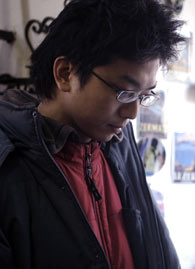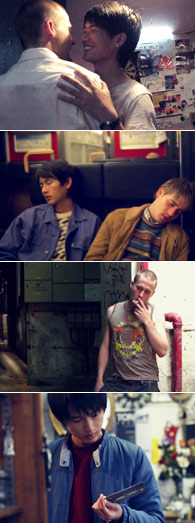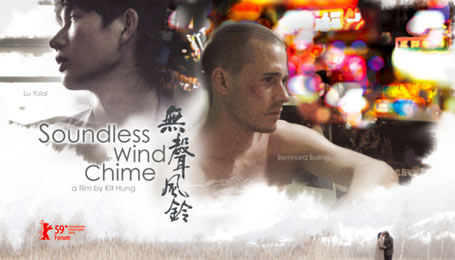Ideas drive Wing Kit Hung, old ideas, cutting edge ideas, concepts refracted by images that give birth to new reflections. He’s fascinated by weaving different things together, traditional Chinese thought, maybe, with the electronic cultures that hold sway across the net, and by juxtaposing things that are ordinary in their own setting, bringing them together to make them extraordinary. He is always a director with a message, a film maker very much in keeping with the times.

Kit Hung
Kit was born and educated in Hong Kong, taking his first degree in Design at the Polytechnic University before turning his back on a commercial life and launching into film. At the Poly U, he was lucky enough to be taught Hong Kong culture by Yau Ching, a Hong Kong LGBT activist and writer who helped his personal breakthrough both in terms of the way he could fit his gay sexual orientation into Hong Kong society and of what he wanted to do with his life. The University allowed him to make a 35-minute film as his graduation project. This, actually his second film (the first was In My Space of Loneliness, his own feelings about his then boyfriend collected into a five-minute short, made with his own video camera in 1999), was entitled [:nv:s:b/e peop/e] and was a film exploring human communications in cyber space. Its two characters, Moon and Sue, never speak, just type text to each other, yet connect so strongly to each other and to others in Hong Kong that the film concludes with the Moon God’s red ribbons linking the entire city. Made in 2000, the film was shown at the Transmediale Festival in Berlin and was successful enough to encourage Kit to go on, which he did the next year with I Am Not What You Want, a phenomenally successful movie which held 2nd place for 11 weeks in HMV’s video sales and was shown at a large number of international festivals, winning the Special Jury Prize at the Festival ‘De Drake’ in Belgium.
I Am Not What You Want broke the mould in more than sales. Much of its popularity can be put down to the simplicity and charm of the very innocent love affair it shows developing between two very ‘normal’ New Territories boys. It is an infectiously joyous film in which gay love is drawn just like any other and which has, for once, a happy ending. Audiences, straight and gay, warmed to it.
“Hong Kong is desperate for this kind of realistic representation of normal gay life,” Kit told me. “My ambition was to make it so ordinary, and I got a lot of comments like ‘I’m not gay, but I like the film’ so I think I succeeded in getting across to mainstream society the idea that gay life isn’t different and that gay people shouldn’t feel isolated.” This worked even for his mother, who had hardly talked to him for the six years since he’d come out; the film includes a scene based on what had happened at Kit’s home where the family sit in embarrassed silence throughout dinner. When she saw the scene, his mother telephoned him in Chicago and told him she understood and that she knew now that he’d really achieved something.

Screenshots from Soundless Wind Chime
Kit was in Chicago due to the success of I Am Not What You Want, which won him a scholarship to study for a MFA in Studio at the School of Art Institute of Chicago. Here, Kit made the 38-minute short Buffering, a story examining long distance relationships and linking technology and the ordinary world, featuring Hong Kong singer-song writer Chet Lam. This won plaudits at film festivals worldwide, including in Turin, and secured him invitations to the Berlin film festival’s Berlinale Talent Campus in 2003 and 2004, a melting pot of European film talent that brought him many of the contacts that he has been able to work with until today. He also began work on Soundless Wind Chime, though this took many years to bring to fruition. Initially, this was a project involving both Kit and a lesbian friend. They separately wrote alternate scenes involving a lesbian and a gay couple, each allowing the other to continue the tale. Sadly, his partner dropped out, depressed by the difficulty of interesting commercial backers in the movie and taking her lesbian stories with her, leaving Kit alone with his gay characters and the struggle to complete the film.
In the meantime, Kit found himself in Switzerland, home of the German Swiss who became and remains his partner. It was a base from which he continued to develop his own style in half a dozen music videos for recording artists from China, Hong Kong (Chet Lam and Kelly Cha) and Switzerland (the popular Swiss singer- song writer, Signorino TJ) and an opening short for the Amsterdam Film Festival. What links all these pieces is the desire, both of Kit and of artists like Chet Lam with whom he works, to break moulds and to escape the clutches of the commercial hardcore. “I use hi-tech methods to create something raw, touchy” he says. “Especially for Signorino TJ, I developed a style like the Monty Python cartoons, which he had introduced to me.” He also made visuals for a Liverpool-based film company for two children’s theatre productions in Switzerland; this too, mixed multi-media elements into the form of a TV game involving ten characters played by three people wearing masks, typically for Kit linking techniques both ancient and new.
All the time, though, Kit was pulling together the script, finance and cast for Soundless Wind Chime. The project received new motivation in Switzerland, where Kit’s partner’s parents both died within a short space of time and Kit found himself wanting to talk to the dead as though they were still there. So, he wrote new parts of the film, parts which form its heart, to resolve the issues which faced him; issues of loss, of dealing with grief, of the denial and the need for final acceptance of death. Rebirth features, in a semi-Buddhist sense and in the reincarnation of a dead person in the form of another who looks the same, maybe is the same, but has no memory of any former life and so can never be the same person. Western viewers may miss some of this on first viewing (for instance the old couple and the young boy parting at the start of the film recalls, to those who know the Chinese story, the old woman who gives the about-to-be reborn soul its soup of forgetfulness before it crosses the bridge to this world). Inevitably, almost all will miss many of the personal references in this film. Yet the scenes arising from Kit’s own experiences in Switzerland, the old Chinese woman dancing, the girl playing the violin, all fit seamlessly into the surrealist atmosphere of the country he recreates.
“I also wanted to show an inter-racial relationship like my own,” Kit adds, “something that was part of me. There are so few shows which show this. I can think only of Ang Lee’s The Wedding Banquet and Simon Chung’s Innocent that do this well. It needs a lot of sensitivity to describe this.” The two leading actors are both outsiders, one a mainland Chinese the other Swiss. Lu Yulai plays a poor Chinese restaurant worker recently arrived in Hong Kong and Bernhard Bulling has two roles, as Pascal, a vagabond Swiss thieving for a meagre living in Hong Kong, and Ueli, his reincarnation (or doppel gänger, perhaps), a gentle shopkeeper in rural Switzerland. The first two characters are also outsiders, the third is cut off from his family through grief. All can scarcely communicate in words, hence the title, for the very real communication that eventually leads to love between the characters is by means other than sounds, chimes singing from the soul, far more effective than mere vocal chords. Pascal dies and maybe is, maybe isn’t, resurrected as Ueli, but how is not important to these themes. Again, Kit breaks stereotypes and, through subconscious linkages, surprises and persuades his audience.
Soundless Wind Chime is already a success; winning the Best Feature Film, Nuovi Sguardi award and a special mention under the Special Jury award at the 24th Torino GLBT Film Festival last month as well as a Teddy Award (the official LGBT award) nomination at the 59th Berlin International Film Festival. It is now distributed by Hong Kong’s Golden Scene and will hit Hong Kong screens in the summer, followed by cinemas in North America, the United Kingdom and Europe. There’ll be a DVD, it seems, by the end of the year. By then, Kit will be deep into his next project, a musical film, and is moving for the time being to Hong Kong to work on it. Here he’ll also carry on doing other things as well, including teaching at the City and Polytech Universities. His next film, he says, will not, for once, be a film with a gay theme, but then Kit doesn’t believe his earlier films have just been ‘gay films’ either, rather films about relationships in which the characters happen to be gay. “Gay films have been an opportunity for me,” Kit confesses. “They are not a limitation. To make something close to you it’s easier to work with the greater energy and passion that your feelings and experience bring to the screen. My films have given me the chance to show what I can do,” he adds. Paradoxically, he believes that the next few years, difficult though they may be economically, may give independent film makers opportunities as the big commercial projects find fewer backers. “There’ll be a lot of creative hunger that’ll need filling up.” He for one intends to rise to this challenge.

